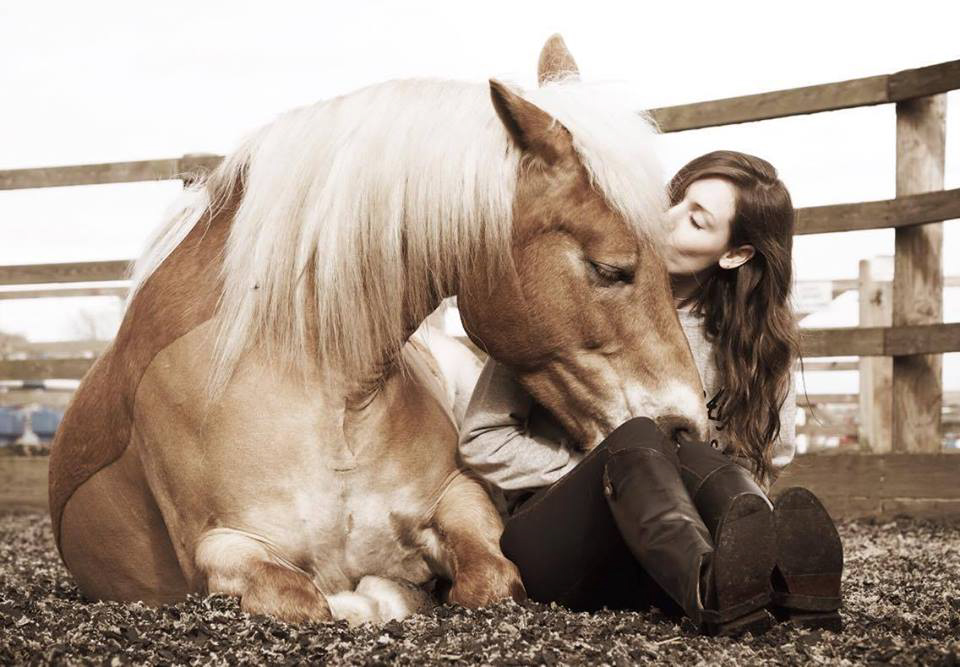I get asked this question a lot and most people want exercises that they can do in the arena to help them to bond with their horses. The truth is, exercises and tricks build communication, but it's everything else that builds the bond.
By 'everything else,' I mean, making sure their needs are met, being consistent and reliable and most importantly, always putting them first. For the first three months I owned Tao, I was the only human to handle him. I was the one who showed up in the morning to turn him out, and the one who brought him in at night. I was the one who fed him, groomed him and made sure he was as happy and comfortable as possible. These things matter to a horse.
Tao has extreme herd anxiety, so it was crucial that he should feel safe and calm when he was away from the herd and with me. Not riding him for those first three months was not easy as an excited new horse owner, but I put his needs first. Nothing you do in the arena will mean as much to them as truly listening to their needs and addressing them. For example, a few days ago, I brought Tao in for some hay because there isn't much grass. I was surprised when he started pulling away from his tie up and trying to leave after a short time, which is usually how he tells me he is ready to go back to the field. It didn't make sense because he couldn't have felt full so quickly. I contemplated putting him back in the field, before I wondered whether he might be thirsty as he was eating dry hay and usually it is soaked. I filled up his bucket of water and sure enough, he was gasping for a drink. As soon as he'd finished, he went back to eating his hay - although they cant speak, they can still talk to us, if we will listen.
I realise with working hours, families and commitments, that it's not always easy to be there for your horse all of the time, but that's OK. Being there as much as you *can* is what counts and making sure that if you're not there, that someone else is, so they're never left without. Over the years I have observed horses who have to fit into their owners lives expressing their opinion through their behaviour about being turned out too late for them, brought in too early for them, over rugged, under rugged, hungry, bored through their behaviour (banging on the stable door, calling, box-walking etc). If these things are happening, we cannot expect our horses to feel favourably towards us. I know as a child, if I was tired, hungry cold or bored, my mum was the one that bore the brunt of my frustration. I don't like getting up at 5.30AM at the weekend or getting home late during the week, but it is one of the major reasons that Tao and I have such a good relationship.
As well as being there for your horse, here are some little things you can do to improve your relationship.
1) If you can, walk your horse to the rest of the herd when you put them back in the field. This shows your horse that you're not abandoning them to be eaten by predators, but will protect them until they are safely with the herd. If they like to run off as soon as you let them go, try giving them a treat...this interrupts the thought to run to the herd. N.B. it may take a few tries for your horse to wait for the treat.
2) Make sure your horse has a full tummy before you ride or exercise them. I try and make sure Tao has at least half an hour to eat some hay before we go out. This puts him in a much better mood and means that it isn't a rush to tack up etc.
3) Take your horse for a walk in-hand just to graze. Prove to them that it's not all about riding and that time with you is fun and rewarding!
4) Praise your horse. A lot. This can be through voice, scratches or treats. It is SO important to build their confidence.
5) Do your best to reduce their stress levels in any way you can. Learn what causes them stress - is it things like going out hacking alone? Being left alone in the field? Loading? Or being the last one turned out? Try and think of ways to improve or avoid these situations. Your horse will thank you for it!
